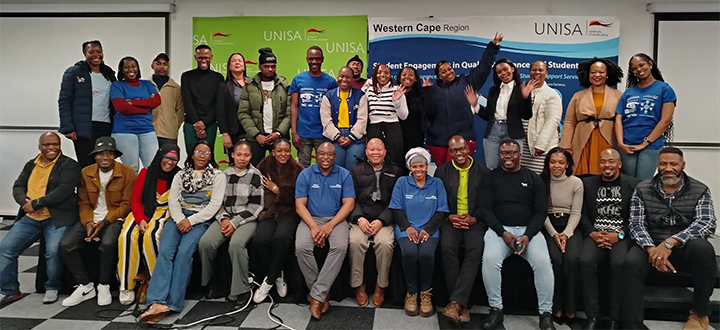News & Events
CAS students take centre stage in shaping academic quality and support

CAS representatives, students and programme participants at the SEQASS Workshop
The Unisa College of Accounting Sciences (CAS) hosted a two-day Student Engagement in Quality Assurance and Student Support (SEQASS) Workshop in the Western Cape Region, bringing together students from across the country, both in person and online.
The workshop created a space for students to engage on academic quality assurance and support, ensuring that their voices are not only heard, but actively shape the direction of the college and institution. The initiative reflects CAS’s recognition that meaningful student participation is vital for academic success, especially in a comprehensive open distance e-learning (CODeL) environment, whilst ensuring alignment with the Council on Higher Education Audit recommendations.
In his opening address, Dr Moses Hlongoane, CAS’s Executive Dean, emphasised the importance of student engagement as an expression of Unisa’s values. “Your attendance is a demonstration of Unisa’s student-centredness. Student engagement is not just a platform to talk; it is embedded in our values of integrity, ethical and collective responsibility, and responsive student-centredness, among others” said Hlongoane. “Your engagement and feedback matter, and they help us to cultivate learning experiences that lead to academic success.”
Hlongoane encouraged students to remain active participants in their studies, stressing that engaged students are more likely to achieve best learning outcomes, develop valuable skills, and grow personally and academically. “When students are engaged, they reap the fruits of their investment. Disengagement, on the other hand, leads to poor academic performance,” he noted.
Unisa’s Regional Head, Michelle Fredenhof, welcomed the students, attesting that the workshop was a practical demonstration of Unisa’s student-centred approach. She also urged students to share their experiences openly and honestly, as this feedback informs how CAS refines its student support systems and teaching strategies.
The students also shared their personal experiences, challenges they face, as well as proposed solutions for academic enhancement. This platform enabled candid conversations on how the college can strengthen student support and quality assurance processes.
Professor Itumeleng Setlhodi, Unisa's HEQAF 2025 Convenor and CHEIAIP Project Leader, explained the rationale behind the initiative, stating that while Unisa has robust academic systems, students must be included in defining the quality of education. “We are intentional in involving you, so that your expectations and future aspirations are reflected in the curriculum, and to further enhance Unisa as a distance university,” she said.
Self-reflection exercises
In addition to active student engagements, CAS also invests in self-reflection exercises to ensure that it offers qualifications of the highest quality. The SEQASS Workshop was followed by a programme review site visit, in which a panel of independent reviewers from industry and academia provided their expertise. The reviewers included representatives from the Association of Chartered Certified Accountants, the South African Revenue Service, Nedbank, and the University of Johannesburg.
According to Professor Cameron Modisane, CAS’s Deputy Dean, these programme reviews are strategic opportunities to measure the college’s performance against national and professional benchmarks. He said: “This is a platform for us to also test our programmes against the CHE quality standards, as well as the Higher Education Qualifications Sub-Framework and South African Qualifications Authority’s requirements at their respective NQF levels. It also enables us to meet the expectations of professional bodies and employers.” Modisane continued: “It is also a moment to reflect on how we deliver on the Unisa mandate as an ODeL institution. Unisa believes in teaching at scale while upholding quality, integrity, and student success.”
During the programme reviews, the college requested that panel members provide candid and actionable recommendations. Strengths would be acknowledged, and areas of concern would be addressed through practical remedies with clear timelines and accountability.
For CAS, this process is crucial, as its programmes are accredited by professional bodies that demand consistent excellence. By combining student engagement with external peer review, CAS ensures that its programmes remain relevant, rigorous, and responsive to both student needs and industry expectations.
A student participant from the workshop commented: “We trust that our feedback will reach the relevant structures. This workshop shows that Unisa is committed to listening and making changes with us, not just for us.”
The workshop was testament that Unisa students are not passive recipients of education, but are active partners in shaping the quality of their academic journey.
*Ntsako Mohlaba, Communication and Marketing Specialist, College of Accounting Sciences
Publish date: 2025-09-10 00:00:00.0

